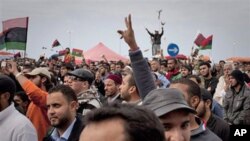Libya has declared an immediate cease-fire across the country and said it was ready to open channels of dialogue with the opposition. The move came only hours before a UN Security Council resolution to impose a no-fly zone over the country was to come into effect.
The announcement by Foreign Minister Moussa Koussa followed a fierce attack by Gadhafi's forces against Misrata, the last rebel-held city in the western half of the country.
Koussa says that Libya, as a member of the UN and in accordance with the UN charter, is obliged to accept the Security Council resolution. He states that his country accepts an immediate cease-fire in order to protect civilians, as well as the territorial integrity of his country. He adds that Libya also encourages the opening of channels of dialogue with everyone.
Regret
Koussa expressed regret over the Security Council resolution, complaining that it would increase the suffering of the Libyan people. He decried the freeze of Libyan assets, as well, arguing that it would affect his country's business dealings, as well as hurting the people.
The U.N. Security Council resolution, passed late Thursday, set the stage for airstrikes, a no-fly zone and other military measures short of a ground invasion. The U.K. and France say they will judge Gadhafi on his actions, not his words.
Both Arabiya TV and Jazeera TV on Friday quoted eyewitnesses saying that Gadhafi's tanks were still shelling the city of Misrata.
Libyan opposition supporters rejoiced overnight in the main rebel-held city of Benghazi, celebrating the UN Security Council decision to impose a no-fly zone over the country. Fireworks lit the nighttime sky, drivers honked their horns and men fired automatic rifles into the air.
More clashes in Yemen
Elsewhere in the region, pro-government supporters and police in Yemen reportedly fired on demonstrators in the capital Sana'a Friday, killing at least several dozen and wounding scores.
In the city of Taiz, south of Sana'a, pro and anti-government supporters also clashed, causing numerous casualties there, as well. Witnesses say that police fired teargas and live rounds at thousands of student demonstrators calling for the resignation of President Ali Abdallah Saleh.
Saudi King promises reform, cash
In Saudi Arabia, King Abdallah announced a series of measures to address public dissatisfaction with the current political and economic situation in the country.
He said that God's word is stronger than all discord and strife, as well as the enemies of religion and the nation. He added that any nation that seeks truth and justice has nothing to fear and that he and his advisors will protect their beliefs and the security of the nation.
King Abdullah also issued decrees to help unemployed workers, boost the pay of civil servants and the military, and build new housing units for young people. He also ordered that investigations be launched into official corruption. Despite the reforms, the Saudi TV indicated that new restrictions were being imposed on the press.
Saudi demonstrators have mostly come from the Shiite-dominated eastern quarter of the kingdom. They share similar grievances as their Shi'ite brethren in the nearby island monarchy, and the Sunni powers fear their unrest will give an opening for Shi'ite Iran to expand its influence on the Arab side of the Gulf.




